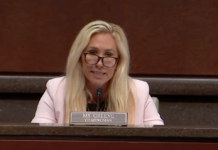
(GA Recorder) — President Joe Biden announced a comprehensive methane reduction plan Tuesday as part of his participation in the United Nations climate summit.
As part of Biden’s plan to curb methane gas emissions, a new Environmental Protection Agency rule will expand and strengthen measures to regulate leak detection and repairs for the oil and gas industry. The rule follows through on an executive order Biden signed when he took office.
The moves are intended to protect the climate, create jobs, improve health and demonstrate U.S. leadership on climate at the critical global summit in Glasgow, Scotland, this week.
President Joe Biden also announced a new U.S. initiative to conserve global forests while meeting Tuesday with world leaders at the U.N. conference.
A third initiative is meant to spark private sector demand for clean energy. The administration has won commitments from a “First Movers Coalition” of major corporations, including Apple, to buy clean energy. The coalition has 25 founding members that will each make commitments to purchase a certain amount of non-fossil-fuel energy.
Potent methane
Biden’s agenda at the U.N. meeting has focused in part on methane, a greenhouse gas that comes from the oil and gas industry, landfills and agriculture.
“This is all part of our new methane strategy, which focuses on reducing the largest source of methane emissions while putting thousands of skilled workers on the job all across the United States and I expect in your countries as well,” Biden said.
By Monday evening in Glasgow, about 90 countries had signed onto a commitment to collectively reduce methane emissions by 30% by the end of the decade.
To show the U.S. interest in the issue, the administration would launch a government-wide initiative to increase methane reduction commitments.
The Environmental Protection Agency plan to reinstate a methane storage and leakage rule goes further than a similar one established under President Barack Obama and later repealed by his successor, President Donald Trump.
In addition, the Interior Department will write a rule to address the same issue on public lands. That rule would cover methane venting, the release of gas into the atmosphere.
And the Pipeline and Hazardous Materials Safety Administration, an agency within the Department of Transportation, would put rules in place to require stronger monitoring by pipeline companies and better leak detection.
The Agriculture Department would also continue a “climate-smart” initiative to help farmers and ranchers operate in more climate-friendly ways.
Forest conservation
Biden’s participation in Tuesday’s session of the conference will focus on a decade-long forest conservation initiative and private sector innovation.
The government-wide forest program would conserve global forests and other ecosystems that naturally capture carbon.
The plan is built around four key components:
- Provide incentives for forest conservation and forest landscape restoration;
- Catalyze private sector investment for conservation;
- Build data systems to enhance accountability;
- Dedicate up to $9 billion of international climate funding for forest conservation.
Manchin objections
Biden spent his first full day at the conference Monday calling for global urgency to confront the climate crisis. He pledged greater U.S. action and apologized for Trump pulling out of the Paris Climate Accord.

But key moderate U.S. Sen. Joe Manchin III, (D-W.Va.), brought renewed doubt to the fate of Biden’s climate agenda in Congress during a Monday news conference in which he said he wavered in his support for the current version of Biden’s spending plan, which includes $555 billion in climate initiatives.
“Throughout the last three months, I have been straightforward about my concerns that I will not support a reconciliation package that expands social programs and irresponsibly adds to our nearly $29 trillion in national debt that no one else seems to care about,” Manchin said in a statement. “Nor will I support a package that risks hurting American families suffering from historic inflation. Simply put, I will not support a bill that is this consequential without thoroughly understanding the impact it will have on our national debt, our economy and the American people.”
Democrats need all their members to support the $1.75 trillion spending plan for it to pass the evenly divided Senate.
Georgia Recorder Editor John McCosh contributed to this report.







